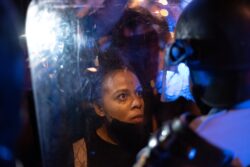Spring 2021
Domestic Conflict
Photographer Abdul Aziz documents tumultuous times
Published: February 28, 2021
Last Updated: March 22, 2023
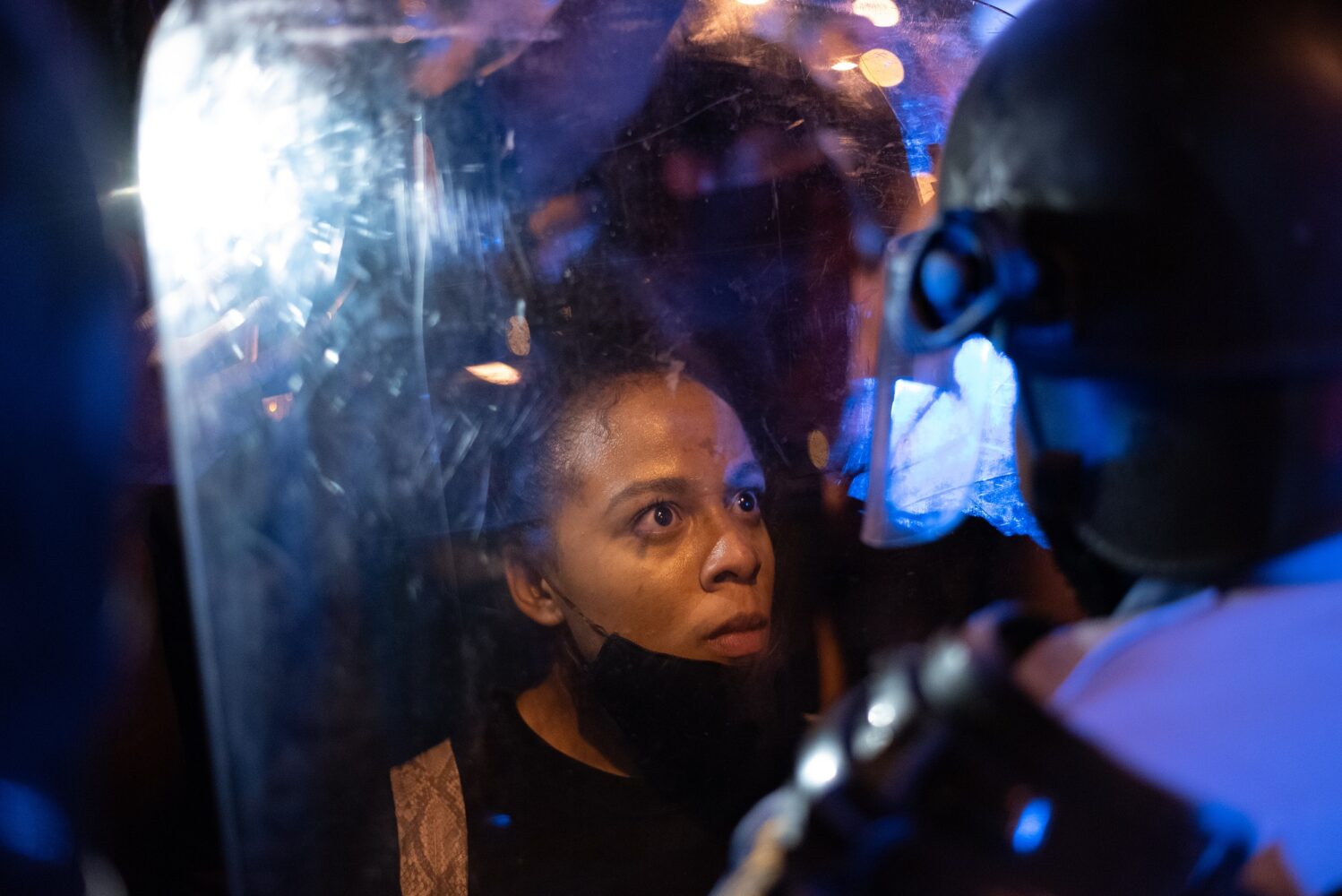
Dawn of a New Era, June 3, 2020. A woman confronts a New Orleans police officer in full riot gear on the Crescent City Connection bridge following the killing of George Floyd by a Minneapolis police officer.
The 2021 Documentary Photographer of the Year is Abdul Aziz. His work capturing scenes of recent social and political unrest across Louisiana and beyond forms a record of our time with deep roots in American history.
Ever since childhood, I have been empathetic, which is perhaps what led me to journalism. In 2008, after being laid off from the Juvenile Justice Project of Louisiana, I stumbled across War Photographer, a film about photojournalist Jim Nachtwey. I found his work visually compelling and impactful enough to change the discourse around politically charged issues. I immediately became enamored with the concept of transformative images.I began storytelling as a documentary filmmaker at the age of 21, setting off on a journey to document the relationship between Buddhism and the culture of the Sherpa people in the Khumbu region of the Himalayas, home to Mt. Everest. This transformative experience helped mold and develop my desire for a deeper understanding of cultures often exploited by the Western world. The often abusive behavior of climbers seeking porter services from Sherpas drove my desire to tell the story of the mountaineering community’s frequently invisible support workers. I made the intentional decision to spend months with them before venturing out on our expedition. This time helped me gain a deeper understanding of Sherpa porters as individuals. The desire to attain in-depth insight into my subjects would become the most critical aspect of my process.
The world of conflict and war photography is, for the most part, driven by sensationalism. At times, parachute journalists looking for a thrill or notoriety swoop in to take images depicting the brutality of war. I never wanted my work to fall into this category. Instead, I’ve immersed myself in conflicts about which I have deep personal convictions. The issues I’ve chosen to document generally have an underlying theme. I seek first to bring a voice to those who are marginalized, and also to provide an objective window into my subjects’ everyday lives so that viewers can develop their own opinions.
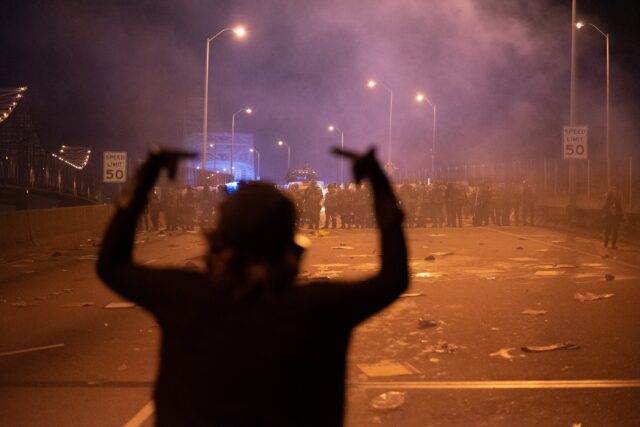
Crescent City Connection, June 3, 2020. Demonstrators face New Orleans Police officers, who deployed tear gas and rubber bullets without authorization on the Crescent City Connection Bridge, during a protest against police brutality.
Many ask how I can find objectivity when I document so many controversial topics. I find it unfortunate that this is the state of journalism. The world has grown to accept that journalism should be polarized, providing consumers with viewpoints that serve an agenda or never take them out of their comfort zone. I want my work to challenge my viewers, to make them think deeply about what they are viewing and the event that created the subject’s circumstances. I remain dedicated to this mission.
Transitioning into documenting domestic conflict has been difficult. While I forge emotional bonds with subjects abroad, I always am conscious that I am only there for a limited time. The summer of 2020 was a particularly grueling time for the entire world. The repetitive imagery of unarmed Black women and men being shot dead by police officers exhausted me. A raging pandemic further exacerbated the isolating nature of documenting injustice and political upheaval. This time the war was at my doorstep, and there was no escaping it.
I feel fortunate to be able to document the voices of my community. To tell stories of the fearless individuals willing to put their lives on the line to fight injustice. The stories of those standing against divisive policies and systems of oppression. The heroes who are not afraid to speak truth to power. It is our responsibility as journalists to tell stories honestly and without bias, and I continue to strive to adhere to the high standard I expect from all of those in my field.
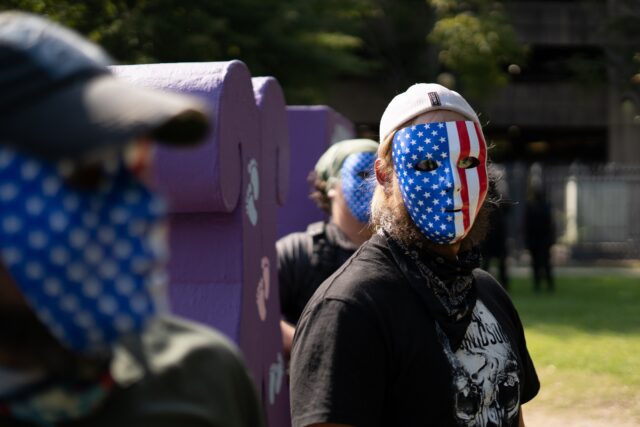
Lafayette, 2020. Louisiana Cajun Militia members at a protest following the fatal shooting of Trayford Pellerin by Lafayette Police officers on August 21, 2020.
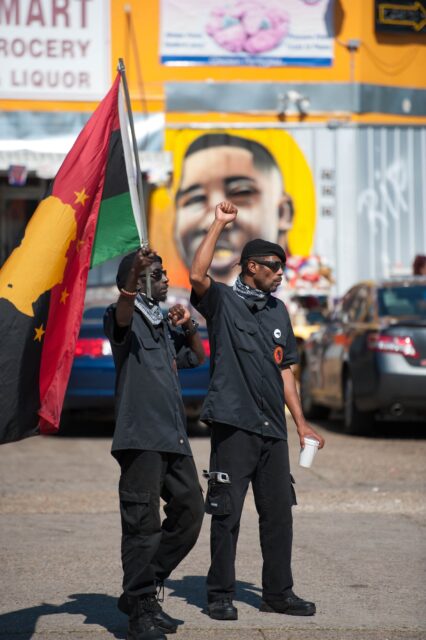
New Black Panther Party, 2017. Members of the New Black Panther Party at a rally in front of the Triple S convenience store, where Alton Sterling was killed by two Baton Rouge Police officers on July 16, 2016.
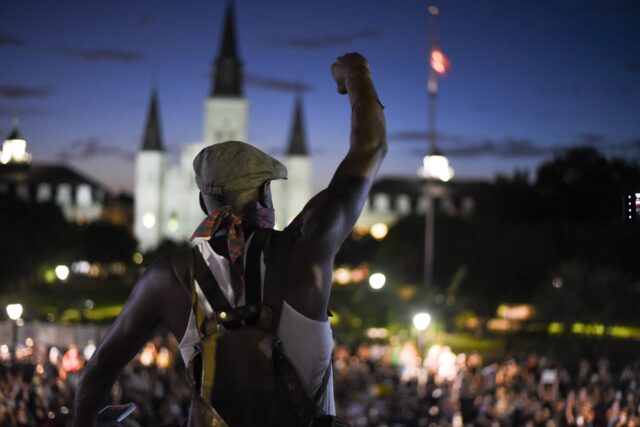
Jackson Square, summer 2020. Rahn Broady looks out over Jackson Square during a night of protest in New Orleans.
